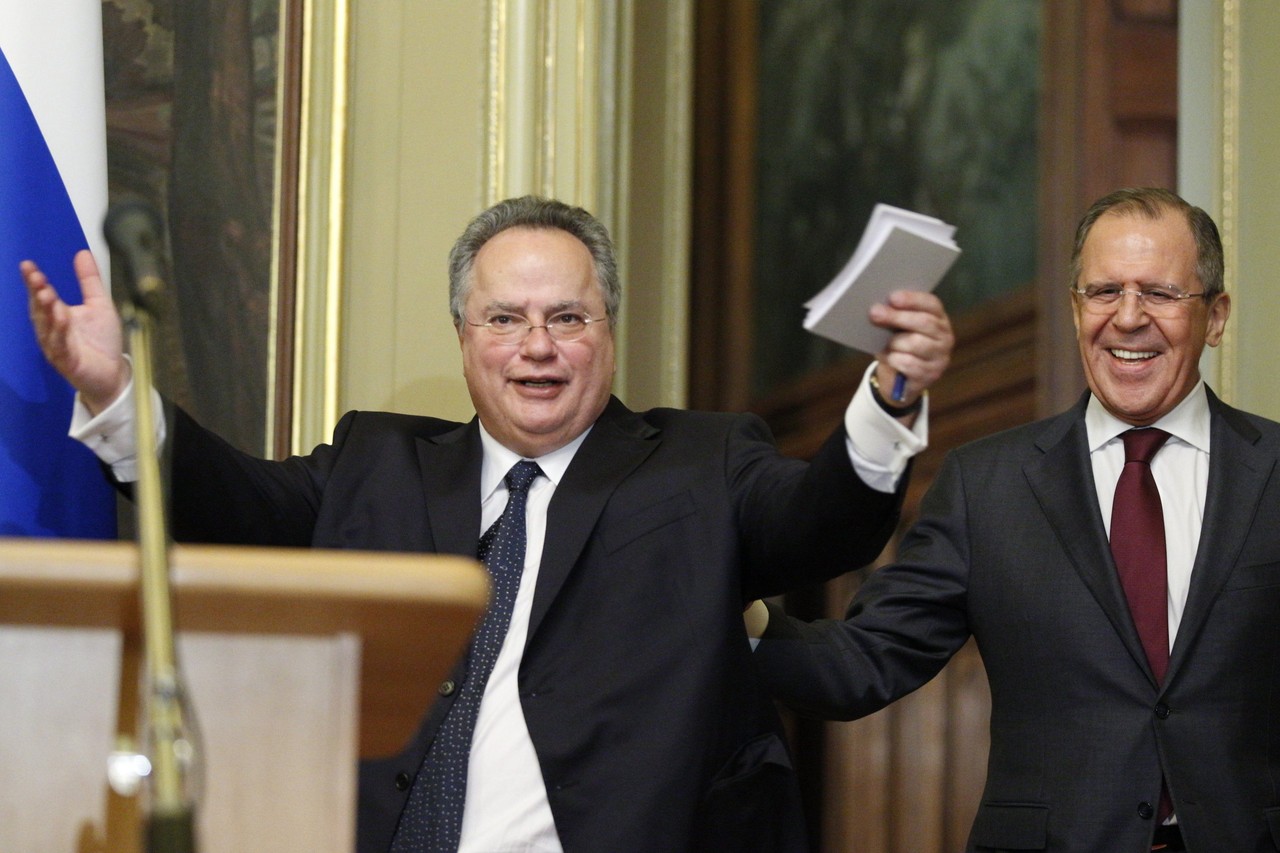Orthodox Christianity, Political Sympathies Create Bond That Complicates Ukraine and Debt Issues
By James Marson, Wall Street Journal
MOSCOW—At a wedding at a countryside hotel near Moscow in October, firebrand Greek nationalist Panos Kammenos sang and cooked traditional food for 90 Greek guests—and one Russian host.
The Greeks were invited by Russian tycoon Konstantin Malofeyev, the groom’s best man and the hotel’s owner. The event had originally been planned for Greece, but Mr. Malofeyev had been barred from the European Union for allegedly supporting pro-Russia militants in Crimea and eastern Ukraine. So the party came to him.
Now Mr. Kammenos is defense minister in the new Greek government. Its warmth toward Russia and ties to anti-American hawks close to the Kremlin have raised concerns in the West that Greece—a member of the European Union and NATO—could stymie already contentious efforts to curb Russia’s support for the militants in Ukraine.
U.S. officials say the Kremlin is trying to spread its foreign-policy agenda in Europe via tycoons such as Mr. Malofeyev, who has links with right-wing movements in the West.
Mr. Kammenos said he didn’t know Mr. Malofeyev before the wedding and that they didn’t talk politics. Mr. Malofeyev said his European connections are religious, not political.
The Russian ties to both parts of the new Greek coalition government—the leftist Syriza party and its junior party, Mr. Kammenos’s right-wing nationalist Independent Greeks—have flourished in recent years, fostered by a mix of shared Orthodox Christianity and traditional left-wing sympathies for Moscow in Greece.
Mr. Kammenos met two senior pro-Kremlin lawmakers just before Greece’s Jan. 25 elections. Prime Minister Alexis Tsipras, the Syriza leader, has also forged contacts with Russian parliamentarians and an official think tank headed by a former KGB officer. Mr. Tsipras has repeatedly said he opposes sanctions against Russia, the cornerstone of the EU’s response to the Ukraine crisis.
In Moscow on Wednesday, Greek Foreign Minister Nikos Kotzias said Greece could mediate between Russia and the EU, criticizing sanctions as ineffective. His Russian counterpart Sergei Lavrov praised the new Athens government’s “constructive line” and noted the countries’ “spiritual closeness.”
European diplomats have said Greece may seek to link its potential veto of new or extended sanctions to greater leeway in its complex debt talks with Europe. Mr. Kotzias said last month Greece could block EU decisions on sanctions, which require agreement among all the bloc’s 28 nations, if they weren’t in Greece’s interest.
Dismissing concerns about links to Russia, Mr. Kotzias said in Brussels on Jan. 29 that Greece is standing up for its own interests, not Moscow’s. “We are not the bad boy,” he said.
But in Moscow, the victory of allies in Athens is being hailed as the crumbling of the EU’s united stance against Russia, with Greece’s new leaders as vectors of Russian influence.
“They had contacts with Russian politicians, and now they started to explain things to people [in Europe] in English,” said Frants Klintsevich, a senior pro-Kremlin lawmaker who hosted Mr. Kamennos in Russia’s parliament in January.
While the Soviet Union used communist ideology to build political relations with the European left, Moscow lawmakers, officials, and conservative ideologues are now also cultivating ties with European right-wing movements, whose religiously conservative, nationalist and frequently anti-American views often echo the Kremlin’s.
Mr. Malofeyev, founder of a private-equity firm, said he was building religious, not political, ties among like-minded circles, from the Austrian far-right to the U.S. pro-life movement. He said most of his Greek acquaintances were monks on Mount Athos, a Greek monastic site many Orthodox Christians consider holy.
The multimillionaire said there was no conspiracy among Russian and foreign conservatives, describing them as simply sharing an interest, like “a group of fishing enthusiasts.” Russia, he said, has become the “supporter and protector” for Christians amid what he described as U.S. initiatives to promote gay rights.
But U.S. officials say Mr. Malofeyev and others are using their money to advance Mr. Putin’s ideological agenda. Last week, U.S. Vice President Joe Biden said Russia had made oligarchs loyal to the Kremlin “into a weapon” of its aggressive foreign policy.
Greece has a long history of warm ties with Russia, and Athens has taken a skeptical view in the past of American intentions. In 1983, the socialist Greek government refused to join Western condemnation when the Soviets downed a South Korean airliner. Greece hasn’t recognized Kosovo, whose U.S.-backed independence Russia condemns.
Mr. Tsipras has made at least two trips to Moscow since 2013. In May, weeks after Russia’s annexation of Crimea drew sanctions from the U.S. and the EU, he met in Moscow with the speaker of the upper house of Russia’s parliament, Valentina Matvienko, a close ally of Mr. Putin who had been sanctioned.
Mr. Tsipras and Mr. Kotzias, a university lecturer and former member of Greece’s Communist Party, also met with the leadership of the Kremlin’s Russian Institute of Strategic Studies. Its director, retired Lt. Gen. Leonid Reshetnikov, a former foreign intelligence officer once stationed in Greece, said the institute’s mission is “to champion Russian state interests.”
A year earlier, Mr. Kotzias met another conservative ideologue, Alexander Dugin, an outspoken anti-American political scientist and supporter of separatists in Ukraine who gave a lecture to a class taught by Mr. Kotzias at the University of Piraeus.
Mr. Malofeyev’s frequent trips to Greece stopped in July, when the EU sanctioned him for alleged close links with separatist leaders in eastern Ukraine and Crimea, which he denies.
The ban scotched plans to travel to the wedding of a Greek businessman he said he had met on Mount Athos. So Mr. Malofeyev invited the wedding party for a three-day celebration in Moscow and at his hotel some 60 miles away called Tsargrad, Russian for Constantinople.
“It was a very happy social event. There was no politics,” Mr. Malofeyev said. “If it so happens that one of these people is now a minister, what can you do about it?”









